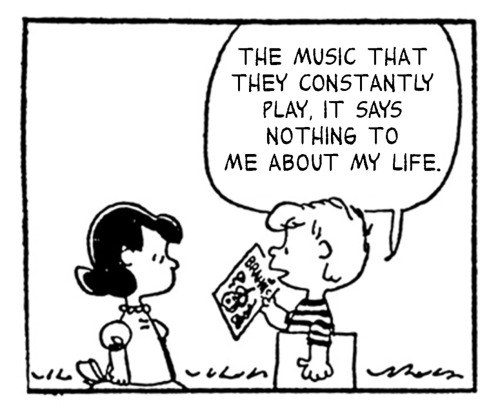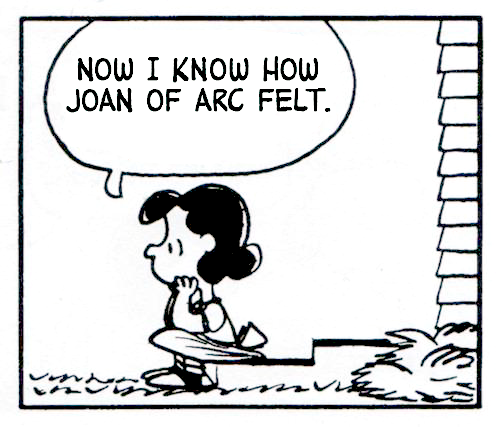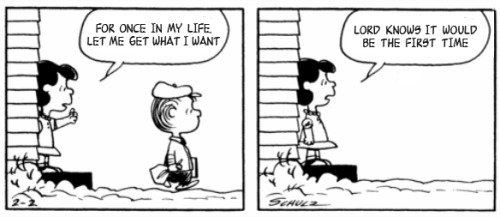Tag: tumblrweed
“We Never Look Up”: what our iLife and iThings mean for our shared humanity
This Tumblr We Never Look Up tracks how technology makes people less present in whatever physical space they’re in.


“A new study showed that young adults who text more than 100 times a day tend to be more interested in wealth, vanity and less so in leading a virtuous life.
Led by psychology professors Paul Trapnell and Lisa Sinclair, the University of Winnipeg study suggested that students who text that much are 30 percent less likely to value living an “ethical, principled life,” compared to those who texted 50 times or less a day. The study also showed that heavy texters exhibited higher levels of ethnic prejudice.
Researcher gleaned their findings from 2,300 freshman psychology students who took online surveys about their goals in life, personality traits and how much they texted. Around 30 percent reported texting 200 or more times a day, while 12 percent indicated they texted more than 300 times a day.”
And this technological evolution is potentially rewiring our brains. That study says people are becoming, like, more superficial and stuff.
“The study aimed to test the “shallowing hypothesis” that Nicholas Carr discusses in his book “The Shallows: What the Internet is Doing to Our Brains.” The hypothesis suggests that relentless texters and heavy users of Twitter are more superficial because the platforms encourage rapid and brief interactions that promote shallow thought.
“The values and traits most closely associated with texting frequency are surprisingly consistent with Carr’s conjecture that new information and social media technologies may be displacing and discouraging reflective thought.”
There’s another book that says we’re all, well, at least the males of the species, becoming man-children because of these changes.
“This new kind of addictive arousal traps users into an expanded present hedonistic time zone. Past and future are distant and remote, as the present moment expands to dominate everything. And that present is totally dynamic, with images changing constantly. Boys’ brains are being digitally rewired in a totally new way to demand change, novelty, excitement and constant stimulation.”
This is mostly due to porn – which does terrible and damaging things to the brain – but the writer of the book quoted in this blog post, also points the finger at the dreaded spectre of video games.
“That means they are becoming totally out of sync in traditional school classes, which are analog, static and interactively passive. Academics are based on applying past lessons to future problems, on planning, on delaying gratifications, on work coming before play, on long-term goal setting.”
Lots of people see the negatives associated with these social changes (and again – there are only negatives associated with the porn industry and what it does to those who fall into its clutches). And there are negatives – if people look at their devices and never connect with real people. That’s certainly not been my experience of social media and its impact on my real world social interactions… sometimes I think someone should study the average age of people who write negative studies about young people.
But are people less connected and more selfish? I don’t know if this is a properly basic understanding of the social web. Even when the web goes wrong – and it did horribly in the aftermath of the Boston Bombings as Reddit went on a terrorist hunt – it goes wrong socially. It goes wrong because it brings people together in new ways. It harnesses the mob mentality. Texting is the same – it can appeal to our baser natures and amplify our capacity for sinfulness. Sure. But you don’t need smart phones and university studies to know that young people are vacuous and vain. In the main. Consider Narcissus. Facebook is the modern day version of the mirrored pool.
Are we failing to grow up? Or are the young people of today forced to confront less affordable housing than ever before because of the avarice of the generations above them. This will cause inevitable social change. So will new technology.
Sooner or later, as Christians, we’ve got to start thinking about how we get people thinking about Jesus when they’re staring at their iThings and playing games. If that’s where people are spending all their time “doing nothing but talking about and listening to the latest ideas” (like the marketplace in Acts 17:21), then we, like Paul, should see that as an opportunity for cultural critique and gospel engagement – not simply hand-wringing and condemnation. Imagine if Luther had condemned the printing press – because people reading and writing pamphlets wouldn’t be talking to other people. Or people ignoring Paul because he wrote them letters rather than being present…
Tumblrweed: Pictures of hipsters taking pictures of food
I take photos of cafe food. Because I have a coffee blog. I guess that makes me a hipster. But most of the time I don’t want to see photos of your food on Instagram. Unless you’re somewhere really cool. Here’s POHTPOF



Tumblrweed: Bad Jokes for/from kids
I couldn’t figure out where the apostrophe should go in bad kid’s jokes. It’s ambiguous. Some of them are from bad kids. Some are bad jokes. Some are bad jokes for kids.
Here’s the premise of this pretty fun site.
“I moderate jokes on a Kids Jokes website. A lot of joke submissions can’t be published because they’re offensive (to kids, or to parents who would hear them repeated at home), or they don’t make sense… so I publish them here instead. I have not edited or made up any of these jokes.”
Here are some samples from the front page.
Peas
WHAT DOES PEAS EAT?
TOAST
Black and White
Q.what do you call black and white, black and white, black and white ,grey, red????
A.A penguin rolling down a hill, hit a rock and DIED!!!!!!
Girls
why are girls freaky?
beacuse they have long hair and there stupid.
Chickens Stop
why did all the chickens stop?
because a fat cow was about to put her bum on them
Zombe
what do you get if you cros a zombe and a persen?
dead!!!!!!!!!!!!!!!!
Tumblrweed: Ordinary Batman Adventures
What does Batman do in a quiet week?
This nice little lo-fi gif collection of animated Batman portraits goes some way to unmysterying (or demystifying) the mystery.
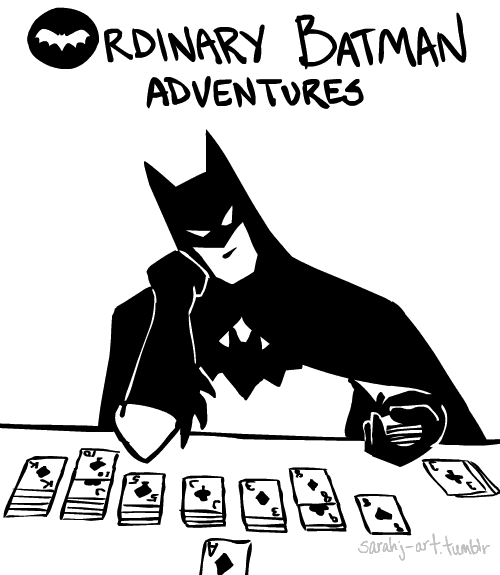

Tumblrweed: Thanks Textbooks
Thanks Textbooks collects badly thought out sections from academic works.
Some examples…



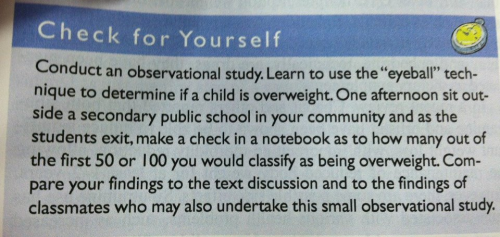

You can, of course, explore more single serving Tumblrs in the Tumblrweed archives.
Tumblrweed: You Chose Wrong
Here you go. A single serving tumblr celebrating the unhappy ending pages of Choose Your Own Adventure books. You Chose Wrong…
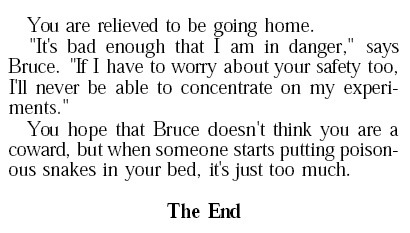
from Choose Your Own Adventure #19: Secret of the Pyramids, 1983
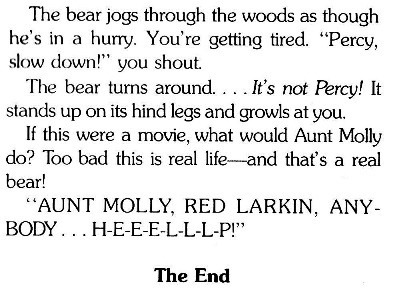
from Choose Your Own Adventure for Younger Readers #41: The Movie Mystery, 1987
Tumblrweed: Hey Internet Girl
Aaron Sorkin, creator of the West Wing and other brilliant things, has written a new show called The Newsroom, if you’re not in Australia you can watch the whole first episode on YouTube.
Anyway, he’s doing a press run for the show, which is just kicking off. And he was a bit of a patronising jerk to a reviewer, Sarah Nicoll Prickett, who points out that the leads in Sorkin’s work are always men.
I reckon a) this is an odd criticism of Sorkin given he’s a guy, and by the look of the reuse of his material, puts a fair bit of himself into his writing, and b) he has produced some of the more memorable and powerful female characters in his major TV shows – so Dana in Sports Night, Abbie Bartlett and CJ in the West Wing, and Jordon in Studio 60…
The review praises the show but absolutely eviscerates Sorkin – the reviewer writes well and it’s a scintillating read.
“The great American dialectic – optimism and realism, faith and reason – is thrillingly animated onscreen, but hardly moreso than on the page. I had to watch the show twice just to believe (a) how good that script was and (b) how incredibly convinced of its goodness, in every sense of “good,” it was.
Hence, my first question starts, “I watched the pilot twice … ” But I don’t get to the question part because Sorkin looks as if he wants to say something. I invite him to do so, and he asks, “Because you liked it so much the first time, or because you didn’t understand it the first time?”
So huge is the hubris in thinking anyone smart enough to write about this show for a national newspaper might not be yet smart enough to understand it (should you fret about your own Sorkin-fathoming abilities, let me say that if you read Don Quixote in the ninth grade or studied American History in the 11th, you will be fine) that I just swallow and tell my own truth.”
And then…
“Sorkin doesn’t see this. He denies being either an ideologue or a modernist, agreeing only that the show is written in his voice, and that said voice is “authorial” (both my word and his). I’d posit that creating an authorial drama in a time of mumbling, precarious, voice-of-a-generation comedy almost absolutely constitutes an ideology, one both modernist and masculinist. But conveniently, at that moment, the interview’s over.
“Listen here, Internet girl,” he says, getting up. “It wouldn’t kill you to watch a film or pick up a newspaper once in a while.” I’m not sure how he’s forgotten that I am writing for a newspaper; looking over the publicist’s shoulder, I see that every reporter is from a print publication (do not see: Drew Magary). I remind him. I say also, factually, “I have a New York Times subscription and an HBO subscription. Any other advice?”
He looks surprised, then high-fives me. Being not a person who high-fives or generally makes physical contact with interview subjects, I look more surprised.
“I’m sick of girls who don’t know how to high-five,” he says. He makes me try to do it “properly,” six times.”
This interview spawned a tumblog. Hey Internet Girl.



The New Yorker has also panned the Newsroom and Sorkin’s ouvre generally…
“There are plenty of terrific actors on this show, but they can’t do much with roles that amount to familiar Sorkinian archetypes. There is the Great Man, who is theoretically flawed, but really a primal truth-teller whom everyone should follow (or date). There are brilliant, accomplished women who are also irrational, high-strung lunatics—the dames and muses who pop their eyes and throw jealous fits when not urging the Great Man on. There are attractively suited young men, from cynical sharpies to idealistic sharpies, who glare and bond and say things like “This right here is always the swan song of the obsolete when they’re staring the future paradigm in the face.””
And earlier…
“Sorkin’s shows are the type that people who never watch TV are always claiming are better than anything else on TV. The shows’ air of defiant intellectual superiority is rarely backed up by what’s inside—all those Wagnerian rants, fingers poked in chests, palms slammed on desks, and so on. In fact, “The Newsroom” treats the audience as though we were extremely stupid. Characters describe events we’ve just witnessed. When a cast member gets a shtick (like an obsession with Bigfoot), he delivers it over and over. In episode four, there’s a flashback to episode three. In a recent interview, Sorkin spoke patronizingly of cop shows, but his Socratic flirtations are frequently just as formulaic, right down to the magical “Ask twice!” technique.”
Ouch. I’ll still watch it. Even if Sorkin’s characters, like his scripts, are rehashed series by series. Because they’re still the best characters and scripts going around.
Tumblrweed: The Composites
If you’re one of those people who prefers to imagine characters from the page with your own imagination, and thus you avoid film versions of your favourite books – then look away.
But if you love the idea of using police composite software to bring book characters to life – then click this link. The Composites.
Here’s a sample – Rochester from Jane Eyre…

“Mr. Rochester, his foot supported by the cushion; he was looking at Adèle and the dog: the fire shone full on his face. I knew my traveller with his broad and jetty eyebrows; his square forehead, made squarer by the horizontal sweep of his black hair. I recognised his decisive nose, more remarkable for character than beauty; his full nostrils, denoting, I thought, choler; his grim mouth, chin, and jaw—yes, all three were very grim, and no mistake. His shape, now divested of cloak, I perceived harmonised in squareness with his physiognomy…My master’s colourless, olive face, square, massive brow, broad and jetty eyebrows, deep eyes, strong features, firm, grim mouth.”
Tumblrweed: Kim Jong Il Dropping the Bass
He might be gone. And Kim Jong Il Looking at Things may have been supplanted by Kim Jong Un Looking at Things (like carpet).

But a little known fact about Kim Jong Il is that nobody dropped the bass quite like he did. And there are photos to prove it.


Tumblrweed: Cosby Sweater Project
Bill Cosby wore a lot of different sweaters. This single serving tumblog collects them, and paints the patterns for posterity’s sake.


